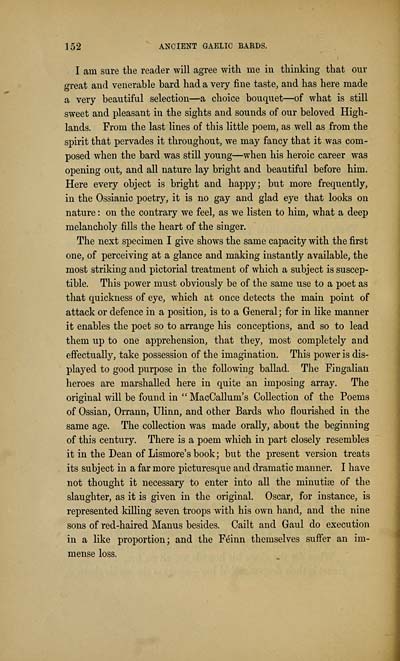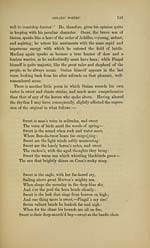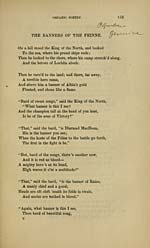Download files
Complete book:
Individual page:
Thumbnail gallery: Grid view | List view

152 ANCIENT GAELIC BARDS.
I am sure the reader will agree with me in thinking that our
great and venerable bard had a very fine taste, and has here made
a very beautiful selection — a choice bouquet — of what is still
sweet and pleasant in the sights and sounds of our beloved High-
lands. From the last lines of this little poem, as well as from the
spirit that pervades it throughout, we may fancy that it was com-
posed when the bard was still young — when his heroic career was
opening out, and all nature lay bright and beautiful before him.
Here every object is bright and happy; but more frequently,
in the Ossianic poetry, it is no gay and glad eye that looks on
nature : on the contrary we feel, as we listen to him, what a deep
melancholy fills the heart of the singer.
The next specimen I give shows the same capacity with the first
one, of perceiving at a glance and making instantly available, the
most striking and pictorial treatment of which a subject is suscep-
tible. This power must obviously be of the same use to a poet as
that quickness of eye, which at once detects the main point of
attack or defence in a position, is to a General; for in like manner
it enables the poet so to arrange his conceptions, and so to lead
them up to one apprehension, that they, most completely and
effectually, take possession of the imagination. This power is dis-
played to good purpose in the following ballad. The Fingalian
heroes are marshalled here in quite an imposing array. The
original will be found in " MacCallum's Collection of the Poems
of Ossian, Orrann, Ulinn, and other Bards who flourished in the
same age. The collection was made orally, about the beginning
of this century. There is a poem which in part closely resembles
it in the Dean of Lismore'sbook; but the present version treats
its subject in a far more picturesque and dramatic manner. I have
not thought it necessary to enter into all the minutiae of the
slaughter, as it is given in the original. Oscar, for instance, is
represented killing seven troops with his own hand, and the nine
sons of red-haired Manus besides. Cailt and Gaul do execution
in a like proportion; and the Fèinn themselves suffer an im-
mense loss.
I am sure the reader will agree with me in thinking that our
great and venerable bard had a very fine taste, and has here made
a very beautiful selection — a choice bouquet — of what is still
sweet and pleasant in the sights and sounds of our beloved High-
lands. From the last lines of this little poem, as well as from the
spirit that pervades it throughout, we may fancy that it was com-
posed when the bard was still young — when his heroic career was
opening out, and all nature lay bright and beautiful before him.
Here every object is bright and happy; but more frequently,
in the Ossianic poetry, it is no gay and glad eye that looks on
nature : on the contrary we feel, as we listen to him, what a deep
melancholy fills the heart of the singer.
The next specimen I give shows the same capacity with the first
one, of perceiving at a glance and making instantly available, the
most striking and pictorial treatment of which a subject is suscep-
tible. This power must obviously be of the same use to a poet as
that quickness of eye, which at once detects the main point of
attack or defence in a position, is to a General; for in like manner
it enables the poet so to arrange his conceptions, and so to lead
them up to one apprehension, that they, most completely and
effectually, take possession of the imagination. This power is dis-
played to good purpose in the following ballad. The Fingalian
heroes are marshalled here in quite an imposing array. The
original will be found in " MacCallum's Collection of the Poems
of Ossian, Orrann, Ulinn, and other Bards who flourished in the
same age. The collection was made orally, about the beginning
of this century. There is a poem which in part closely resembles
it in the Dean of Lismore'sbook; but the present version treats
its subject in a far more picturesque and dramatic manner. I have
not thought it necessary to enter into all the minutiae of the
slaughter, as it is given in the original. Oscar, for instance, is
represented killing seven troops with his own hand, and the nine
sons of red-haired Manus besides. Cailt and Gaul do execution
in a like proportion; and the Fèinn themselves suffer an im-
mense loss.
Set display mode to: Large image | Transcription
Images and transcriptions on this page, including medium image downloads, may be used under the Creative Commons Attribution 4.0 International Licence unless otherwise stated. ![]()
| Early Gaelic Book Collections > J. F. Campbell Collection > Selections from the Gaelic bards > (186) |
|---|
| Permanent URL | https://digital.nls.uk/77160713 |
|---|
| Description | Volumes from a collection of 610 books rich in Highland folklore, Ossianic literature and other Celtic subjects. Many of the books annotated by John Francis Campbell of Islay, who assembled the collection. |
|---|
| Description | Selected items from five 'Special and Named Printed Collections'. Includes books in Gaelic and other Celtic languages, works about the Gaels, their languages, literature, culture and history. |
|---|

